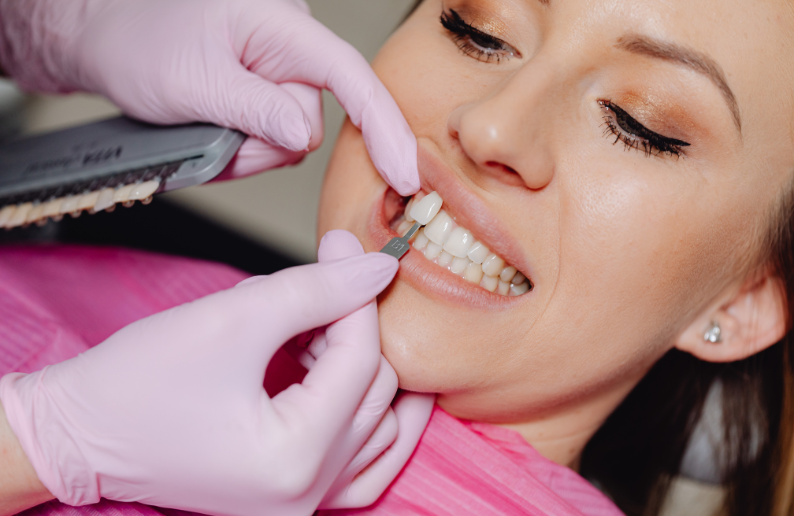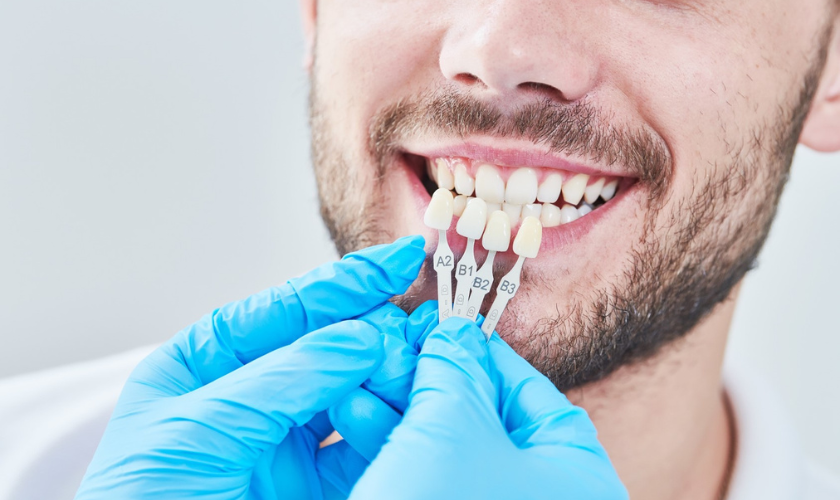New Patients Welcome!

Dental veneers are a popular cosmetic dentistry solution for achieving a flawless smile. Whether you’re correcting discolored, chipped, or misaligned teeth, veneers offer a long-lasting aesthetic improvement. However, after getting dental veneers, some individuals may experience major pain. While mild discomfort is expected during the adjustment period, intense or persistent pain is not something to overlook.
In this blog post, we will explore the possible causes of pain after getting dental veneers, how to manage and alleviate it, and when to seek professional help from an emergency dentist.
Common Causes of Pain After Getting Dental Veneers
Experiencing pain or discomfort after getting veneers can happen for several reasons. It’s important to identify the source of the pain to effectively address the issue. Here are some of the most common causes:
1. Tooth Sensitivity
During the veneer placement process, a small amount of enamel is shaved off to ensure the veneers fit properly. This removal of enamel can expose the underlying dentin, which can cause sensitivity to hot, cold, or sweet foods and beverages. Sensitivity is common in the days following the procedure but should lessen over time.
2. Gum Irritation
Veneers are placed along the gum line, and the procedure can sometimes irritate the surrounding gum tissue. This can cause inflammation, tenderness, and mild pain. Gum irritation typically resolves within a week or two as the gums heal and adjust to the new veneers.
3. Bite Misalignment
If the veneers are not properly fitted or if they affect your bite, you may experience discomfort when chewing or closing your mouth. A misaligned bite can cause uneven pressure on specific teeth, leading to pain not only in the affected teeth but also in your jaw and gums.
4. Nerve Damage or Irritation
In rare cases, the placement of veneers can disturb the nerve inside a tooth. This can result in sharp, ongoing pain that needs to be addressed promptly by a dentist. Nerve irritation is more likely to occur if the tooth was previously decayed, damaged, or had undergone a root canal.
5. Tooth Decay
If the underlying tooth was not properly treated before the veneer placement, tooth decay could still exist under the veneer, causing pain. The veneer may mask the symptoms initially, but as the decay worsens, it can lead to severe pain.
6. Post-Procedural Trauma
The process of applying veneers involves drilling and manipulating your teeth, which may cause some trauma to the tooth or gums. This trauma can manifest as pain, especially during the first few days after the procedure.
Steps to Alleviate Pain After Getting Dental Veneers
If you are experiencing significant pain after your veneer procedure, there are several steps you can take to manage and alleviate discomfort. Here’s a guide on how to handle this situation:
1. Take Over-the-Counter Pain Medication
For mild to moderate pain, over-the-counter pain relievers like ibuprofen or acetaminophen can help reduce inflammation and ease discomfort. These medications should only be used as a short-term solution and according to the recommended dosage.
2. Avoid Hard, Crunchy, or Sticky Foods
In the days following your veneer placement, avoid foods that require excessive chewing or put undue pressure on your teeth. Hard foods like nuts, sticky candy, and crunchy vegetables can cause stress on your veneers and worsen pain. Opt for soft, room-temperature foods like soups, yogurt, mashed potatoes, and smoothies until the pain subsides.
3. Use Desensitizing Toothpaste
If tooth sensitivity is contributing to your discomfort, switching to a toothpaste formulated for sensitive teeth can help. Desensitizing toothpaste works by blocking pain signals from your tooth’s nerve, providing relief from temperature sensitivity. It may take several applications to see improvement, so use it consistently over time.
4. Rinse with Salt Water
A saltwater rinse can help soothe irritated gums and reduce inflammation. To make a saltwater solution, mix ½ teaspoon of salt into a glass of warm water and swish it around your mouth for 30 seconds before spitting it out. Repeat this process two to three times a day to promote healing and relieve discomfort.
5. Avoid Extreme Temperatures
Hot and cold foods or drinks can trigger sensitivity, especially after veneer placement. Stick to room-temperature beverages and foods to avoid aggravating the sensitive areas of your teeth.
6. Maintain Good Oral Hygiene
Ensuring that your teeth and gums remain clean and healthy is vital for healing and pain relief. Brush your teeth twice a day with a soft-bristled toothbrush and non-abrasive toothpaste, floss daily, and consider using an antimicrobial mouthwash to keep your mouth bacteria-free.
When to See an Emergency Dentist
While some discomfort is normal after getting dental veneers, certain signs indicate that you should seek professional help from an emergency dentist. Here are a few red flags to watch out for:
1. Persistent, Severe Pain
If your pain is severe, constant, or worsens over time, it may be a sign of nerve damage, infection, or an underlying dental issue that requires immediate attention. Dental pain that lasts longer than a week after the procedure should always be examined by a dentist.
2. Loose or Dislodged Veneers
If you feel that your veneers are loose or if one has dislodged, it is important to visit your dentist as soon as possible. A loose veneer can expose the tooth beneath, increasing the risk of decay and further complications.
3. Swelling or Bleeding of the Gums
While mild gum irritation is expected, excessive swelling, prolonged bleeding, or pus around the veneer site could indicate an infection or poor fit of the veneers. An emergency dentist can assess the situation and provide appropriate treatment.
4. Sharp, Throbbing Pain
Pain that radiates or throbs could be a sign of nerve irritation, especially if the tooth was previously treated for decay or underwent a root canal. This type of pain warrants an immediate visit to the dentist to prevent further damage.
5. Unnatural Bite
If your veneers cause discomfort when you bite down or chew, they may not be properly aligned. An emergency dentist can adjust the veneers to ensure a comfortable fit and relieve pain caused by bite misalignment.
Long-Term Care for Veneers to Prevent Pain
To avoid pain and discomfort after getting veneers, it’s important to practice proper care and maintenance. Here are some tips for keeping your veneers in top condition and preventing potential issues down the road:
1. Maintain Regular Dental Checkups
Routine dental visits are crucial to monitor the health of your veneers and the surrounding teeth. Your dentist will check for any signs of wear, decay, or gum disease, ensuring that your veneers last for years without causing discomfort.
2. Wear a Night Guard if You Grind Your Teeth
Bruxism (teeth grinding) can put excessive pressure on your veneers, leading to wear, damage, and pain. If you tend to grind your teeth at night, talk to your dentist about getting a custom-made night guard to protect your veneers.
3. Avoid Staining Foods and Drinks
While veneers are resistant to stains, the edges where they meet your natural teeth may still become discolored. To prevent this, avoid staining foods and beverages like coffee, tea, red wine, and dark berries.
4. Brush and Floss Daily
Consistent oral hygiene is essential to maintaining the health of your teeth and veneers. Brush your teeth at least twice a day with a non-abrasive toothpaste, and floss regularly to remove plaque and food particles.
5. Avoid Using Your Teeth as Tools
Your teeth, including veneers, should never be used to open packages, bite your nails, or tear into hard objects. Doing so increases the risk of veneer damage, which can lead to pain and require replacement.
While dental veneers can dramatically enhance your smile, it’s essential to be aware of potential post-procedure discomfort and pain. By understanding the causes of veneer-related pain and taking steps to manage it, you can ensure a smooth recovery and long-lasting results. If the pain persists or worsens, don’t hesitate to reach out to an emergency dentist for professional care. Proper maintenance and regular checkups will help keep your veneers in great shape for years to come, ensuring your smile remains both beautiful and pain-free.





